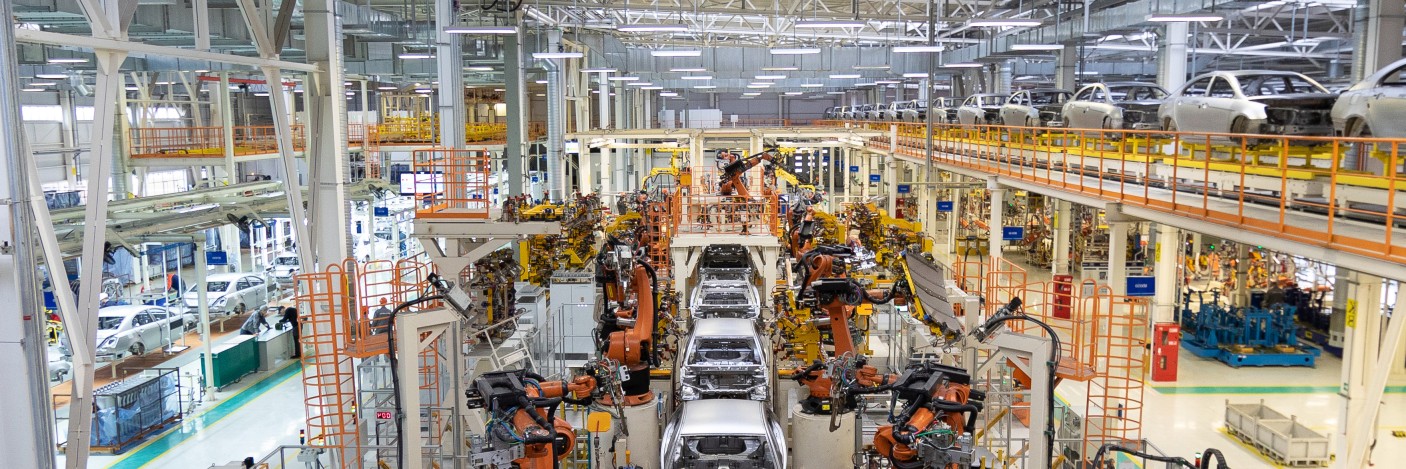The pandemic-related chip shortage has forced General Motors to temporarily halt production of nearly all of their plants in the US this month, according to The Detroit Free Press. This includes the assembly lines at GM’s Detroit area plants, which are responsible for making 80% of GM cars sold in North America. The delays are coming amidst a nationwide pattern related to the recent pandemic that is pushing up prices for parts and materials across various industries including GM’s own suppliers. The shortage will get worse where inventory is low, so production may get shelved completely if it doesn’t get resolved soon.
The pandemic-related chip shortage has caused a series of delays for General Motors. The company’s Detroit area plants, which make 80% of GM cars sold in North America, have been suspending production since last month. During a press conference on Friday, General Motors spokeswoman Sharon Basel said the delays were necessary “to build an inventory of critical components critical to the manufacture of our vehicles.”
Mass production was halted due to an industry-wide shortage of computer chips used to run certain functions of GM automobiles. According to the Wall Street Journal, such chips are used in ignition systems and airbag technology. This has left GM without an option but to halt production. The company’s largest supplier, Taiwan Semiconductor Manufacturing Company, said last week that it would be unable to meet demand because chip makers have been experiencing problems shipping materials overseas.
Why is there a chip shortage?
A major reason why the chip shortage has been so serious is related to the severity and impact of the recent pandemic. Delays in delivering supplies and components to manufacturers caused by high demand and dwindling inventories at chip makers were essentially expected to happen for this type of manufacturing. However, they have been happening too frequently, which has resulted in a nationwide trend that is pushing up prices for parts and materials across various industries including GM’s own suppliers.
According to the Wall Street Journal, materials prices have more than doubled since January. Reportedly, carmakers including GM are dealing with more than $200 million in additional chip inventory problems. As a result, some suppliers are having to resort to raising prices on components that they buy from other suppliers. This is causing shortages of parts that go into various industries including automotive manufacturers, which is causing disruptions in supply chains that can’t be solved by inventory adjustments alone.
Who else has this affected?
The chip shortage has had an effect on GM’s production lines at their Detroit area plants as well as vehicles made by its two largest competitors, Ford and Chrysler. Production was idled at GM’s Detroit area plants, which are responsible for making 80% of GM cars sold in North America. The company had suspended assembly lines last month. On Friday, GM said that it would not be resuming production of certain models until mid-July.
Ralph Hudas, president of the plant that makes the Chevrolet Malibu and Impala sedans said production will resume once inventory renewals are processed and parts supplies begin to increase again. “We’re not going to build cars longer than we can sell them.” Hudas said. “It’s gonna take a couple of weeks for us to get back up and running. I’m not saying there is anything you can do to speed up the process.” Additionally, GM’s biggest US plant in Lordstown, Ohio, will be idled for two weeks.
General Motors has also had to delay some of its European deliveries due to chips manufactured by its suppliers. However, the company said that it will be able to meet the additional demand created by the recent pandemic without slowing production rates for North American vehicle dealers. According to The Wall Street Journal, sources inside of General Motors said that they are considering reducing output on some lines over the next week or so. This would be an effort to avoid having too much inventory of certain car models.
Will they make their own chips?
On the other hand, General Motors has been working on alternate components that are being used until the chip shortage is resolved. For instance, GM may use larger auto-lock electric systems to replace outdated ignition systems that use chips. Engineers are also working on developing software that could be loaded onto steering wheels to take care of functions that have been targeted by the chip shortage. Other automakers including Ford and Chrysler have their own plans for dealing with the problem as well.
Many carmakers have turned to their suppliers for help during the chip shortage crisis. For instance, GM will be shifting some of its parts orders at Delphi Automotive PLC, which supplies auto instrumentation, to other suppliers including Japan’s Denso Corp. The company is also trying to increase the production of certain components that are being used in its vehicles, which have been affected by the shortage. GM has also been working to resolve the problem with chip suppliers, which are its largest customers.
General Motors is the first automaker to have halted production due to a chip shortage related to the recent pandemic. The company’s stock price has risen by more than 10% since January 25th, when the first reports of a possible chip shortage first surfaced. If General Motors doesn’t resolve their problems with their suppliers quickly, it may be forced into further shutdowns that could potentially lead to additional delays for consumers who can’t afford to wait any longer for cars made by Ford or Chrysler.
Conclusion
Chip shortages will continue to affect companies like General Motors and Ford as we head through the second half of 2021, but there might be a silver lining to the problem. The pandemic has affected GM more than Ford and Chrysler, which means that GM is on pace for a stronger first half since it has had time on its side. Additionally, new manufacturing technologies that develop as a result of this chip shortage problem could bring efficiency gains and cost savings that improve profits across multiple industries including automotive manufacturers.






